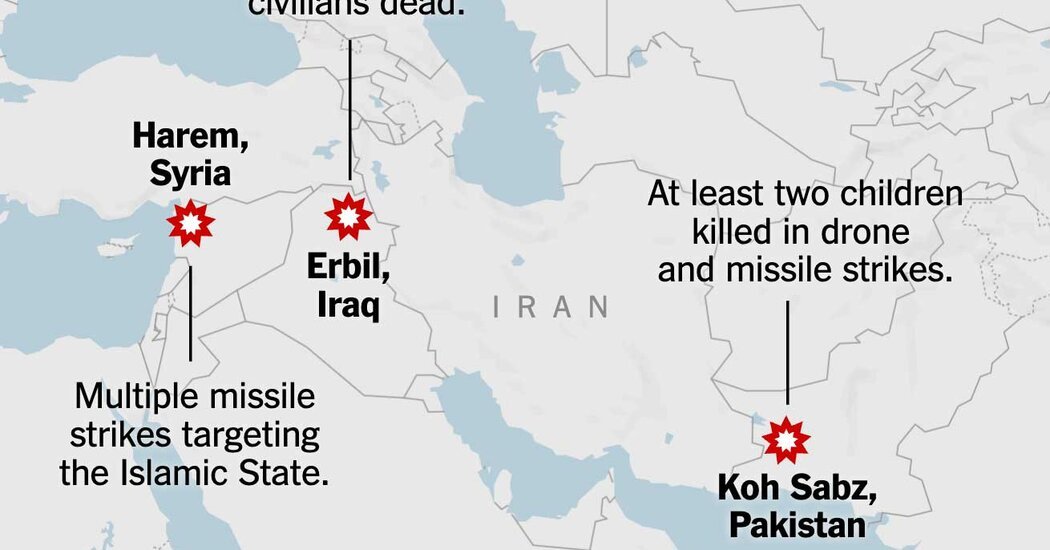Iranian strikes inflame regional tensions
A day after Iran launched missile strikes in neighboring Pakistan, Iran’s defense minister vowed yesterday that his country would “not set any limits” on using its capabilities against enemies whenever necessary.
The strikes have raised tensions in a region where conflict has now touched at least five nations.
In a statement, Pakistan, a nuclear-armed state, said it “reserves the right to respond” to what it called an illegal and unprovoked attack. The country expelled the Iranian ambassador to Islamabad and recalled its own ambassador from Iran. But retaliation could risk drawing Pakistan, which is already mired in political and economic crises, into Middle East upheaval that it has so far avoided.
Details: Iranian strikes also hit targets in Syria and Iraq this week. Iranian officials said the strikes targeted terrorists they accused of being behind the bombing that killed 86 people earlier this month at a memorial procession for Maj. Gen. Qassim Suleimani. The Iraqi and Pakistani governments rejected Iran’s justifications and both countries reported civilian casualties.
Analysis: Experts say Iran is walking a fine line, hoping to flex its strength to show conservatives at home that it can hit its enemies — without getting directly entangled in a fight with Israel, the U.S. or their allies.
China wants women to have more babies
China’s birthrate has continued to fall and the population declined again, despite government efforts to encourage women to have more babies. And while its economy grew by 5.2 last year, its growth is slowing in the longer term.
To encourage women to have more children, China has offered housing, tax and cash incentives — and even appealed to their patriotism, calling on them to be “good wives and mothers.”
It’s not working: Last year, the population shrank for the second straight year, official data released yesterday showed, and births fell for the seventh year in a row, threatening China’s efforts to stabilize its shrinking and aging population.
The economic growth is a sign of China’s rebound from “zero Covid” pandemic controls, but it also hides a long-term weakness: Fewer babies will eventually mean fewer working-age people.
Youth unemployment: The statistics agency also released new data after a pause last summer. It’s now using an “optimized” method which has lowered the figure.
Reaction: Hong Kong stocks sank nearly 4 percent amid worries over China’s economy.
Gazans fled a hospital as fighting intensified
Displaced Palestinians sheltering at Nasser Hospital, the largest hospital in the southern Gaza Strip, fled the grounds late Tuesday night as fighting flared nearby, videos show. The combat near the hospital, which is in Khan Younis, raised fears that Israeli troops might be advancing toward it.
About 7,000 people are believed to have been sheltering at the facility, the U.N. said. Many Gazans have relocated several times since the war began, reinforcing the feeling that nowhere in the enclave is safe.
THE LATEST NEWS
Asia Pacific
Simbarashe Cha, who explores street style around the world for The Times, visited Melbourne, Australia. The black palette and tattoos reminded him of Berlin. See his photos here.
Being bilingual may keep you sharp
Studies suggest that bilingual people enjoy some cognitive benefits later in life, and that speaking a second language could even delay Alzheimer’s disease by five years.
“We use language in all aspects of daily life, so a bilingual brain is constantly working,” a professor at Western Sydney University in Australia who specializes in bilingualism said. “You don’t really get that from other enriching experiences, like playing a musical instrument.”
The age at which you learn a language seems to be less important than how often you speak it, an expert said. Older adults who are trying to learn a second language as a hobby may see some benefit, but the evidence is shakier.





